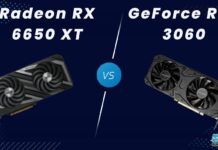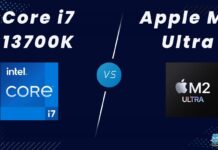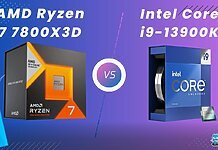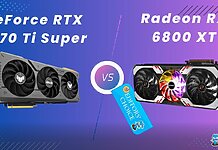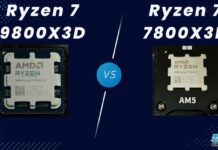This article extensively compares Nvidia’s first ray-tracing supportive entry-level card, the RTX 3050, and Intel’s top-of-the-line and value mid-ranger, the ARC A750. We will cover all the essential details about the ARC A750 vs RTX 3050 and see if Intel’s first graphics card will be able to compete with one of the top graphics cards by Nvidia.
Key Takeaways
- The ARC A750 ran about 38% better in the tests we conducted at 1080p.
- Our power consumption measurements indicate that the RTX 3050 is significantly more energy-efficient, drawing 42% less power than the ARC A750.
- Temperature-wise, the RTX 3050 maintained a marginal 0.15% cooling advantage over the ARC A750.
Comparison Table
| Technical Specs | Intel ARC A750 | GeForce RTX 3050 |
|---|---|---|
| GPU Name | DG2-512 | GA106 |
| Architecture | Generation 12.7 | Ampere |
| CUDA Cores | 3584 | 2560 |
| Tensor Cores | 448 | 80 |
| RT Cores | 28 | 20 |
| TMUs | 224 | 80 |
| ROPs | 112 | 32 |
| Suggested PSU | 550 W | 300 W |
| Release Date | Oct 12th, 2022 | Jan 4th, 2022 |
| Approximate Price | 310 USD | 265 USD |
| Best Variants | - | Best RTX 3050 Cards |
Architectural Differences
- Process Size: The Intel ARC A750 has a relatively small process size of 6nm. On the other hand, the RTX 3050 dons a process size of 8nm, which was the standard size for GPUs at the time of its release.
- Clock Speeds: Speaking of the frequency of the cards, the RTX 3050 has a higher base clock of 2050 MHz, which can be boosted to 2400 MHz. Whereas the ARC A750 has a base clock of 1552 MHz, which can be accelerated up to 1777 MHz.
- VRAM: With regards to the VRAM, the RTX 3050 boasts an 8GB GDDR6 of RAM, whereas the ARC A750 consists of GDDR6 memory of 6GB.
- TDP: In terms of the Thermal Design Power, ARC A750’s 225W TDP is relatively higher than the RTX 3050’s 130W.
- Supported Technologies: With its 28 RT Cores, the ARC A750 showcases better Ray Tracing performance than the RTX 3050 due to its lesser RT Cores, 20 RT Cores to be specific.
Benchmarks
For our benchmarks, we thought it would be better to test both cards for the resolution they were intended for, 1080p. In doing so, we fitted them into our test bench, the specifications of which you can read below:
Testing Rig
- OS: Windows 11
- CPU: Intel Core i7-13700K
- Motherboards: ASRock Z790 Taichi Lite Motherboard
- RAM: Kingston Fury Renegade RGB DDR5 32GB 7200MHz
- SSD: XPG GAMMIX S70 BLADE 2TB NVMe SSD
- PSU: Enermax Revolution D.F. X 1050W
- CPU Cooler: MSI MAG CORELIQUID E360 CPU Liquid Cooler
Hitman 3
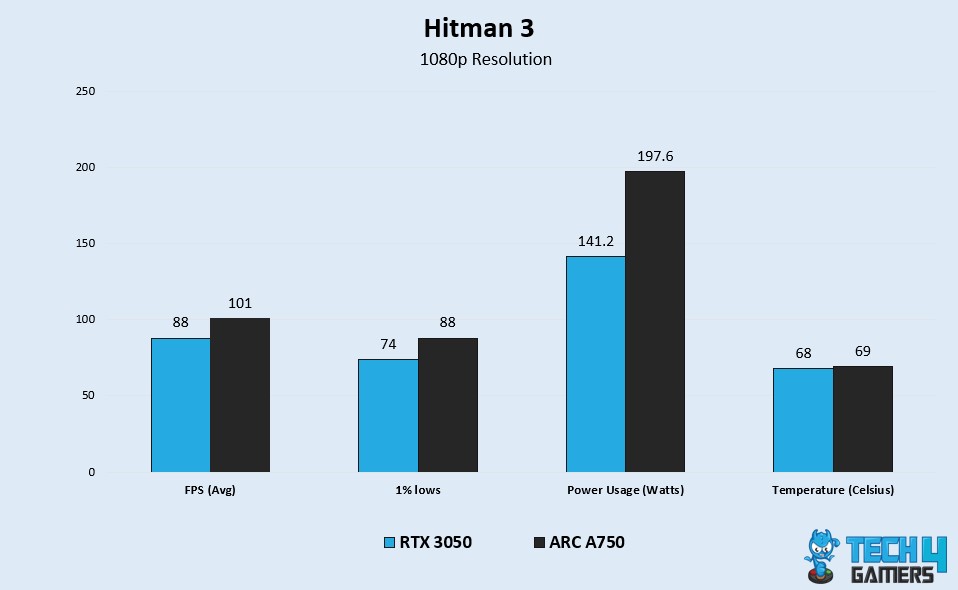
- First up, we have Hitman 3, where the ARC A750 tops out with 101 FPS on average against the RTX 3050’s 88 FPS.
- At 1% lows, the RTX 3050 only managed 74 FPS, but the ARC A750 went on to perform with 88 FPS.
Red Dead Redemption 2
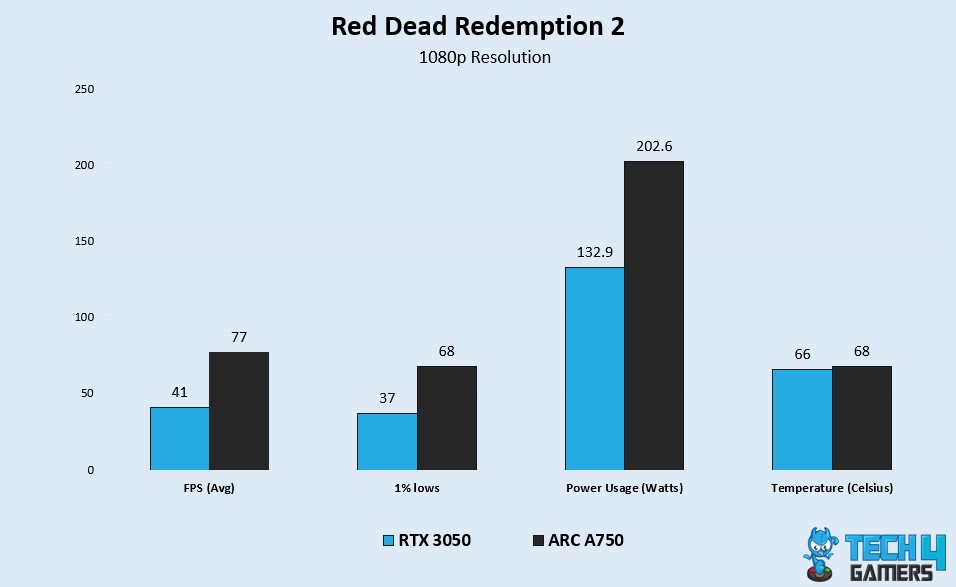
- Our test of RDR 2 showed that the RTX 3050 has been clearly outperformed by the ARC A750, which had an average of 77 FPS, while its competitor only attained 41 FPS.
- At 1% lows, the ARC A750 delivered an impressive 68 FPS, while the RTX 3050 could only manage 37 FPS.
Forza Horizon 5
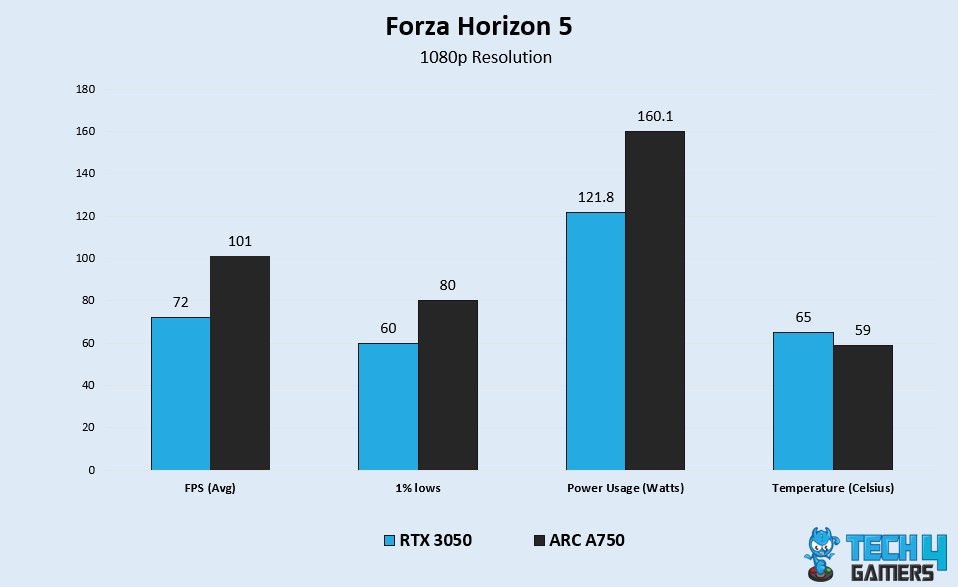
- In our run of Forza Horizon 5, the RTX 3050 operated at an average framerate of 72 FPS, while the ARC A750 prevailed with a much higher 101 FPS average.
- At 1% lows, the ARC A750 again triumphed, achieving 80 FPS to the RTX 3050’s 60 FPS.
Microsoft Flight Simulator
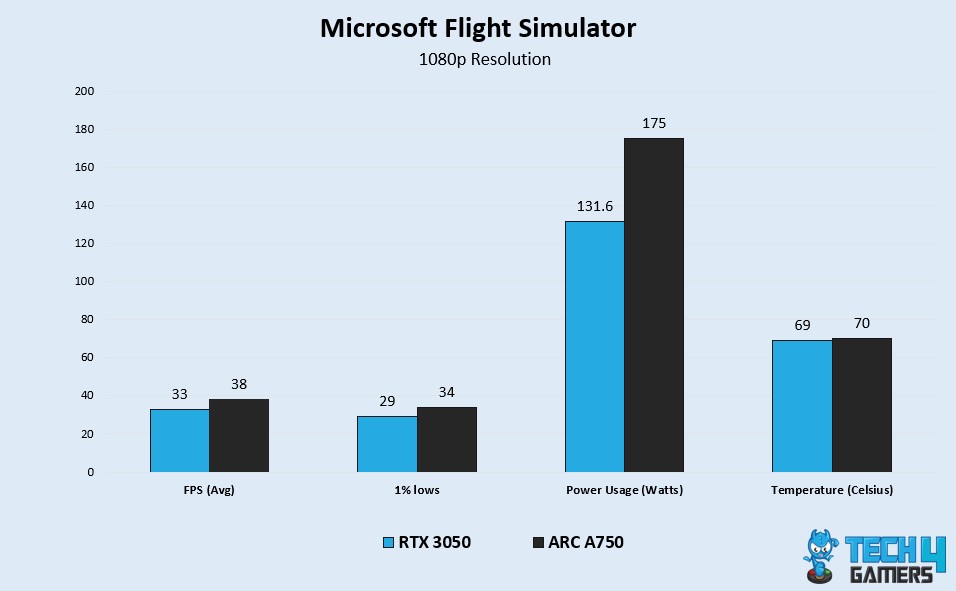
- Microsoft Flight Simulator is next in the line where the ARC A750 dominated with 38 FPS on average in our test with high settings, standing far from the RTX 3050’s 33 FPS average.
- While the RTX 3050 came up with 29 FPS at 1% lows, the ARC A750 was more playable with 34 FPS as its minimum.
Marvel’s Spider-Man
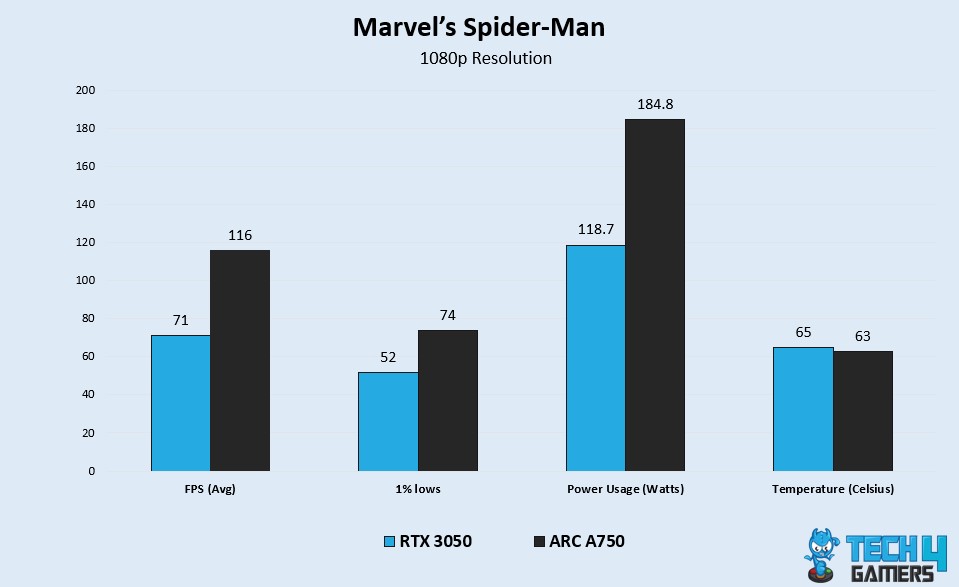
- Our test of Marvel’s Spider-Man favored the ARC A750, which outshined the RTX 3050 with 116 FPS, which its competitor operated with only 71 FPS.
- At 1% lows, the RTX 3050 performed with 52 FPS, but the ARC A750 went far beyond that, achieving 74 FPS.
PlayerUnknown’s Battlegrounds (PUBG)
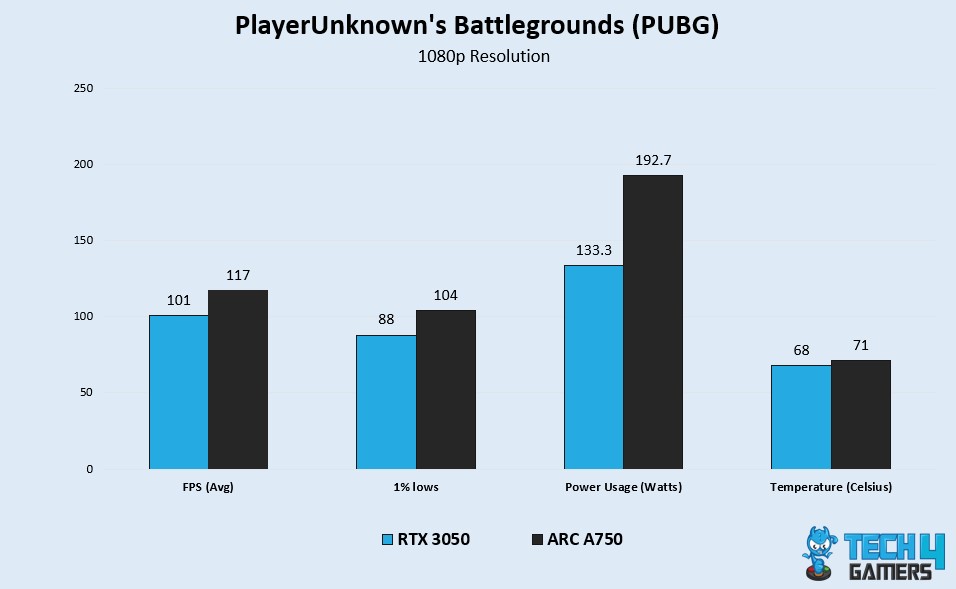
- We tested the world-famous Battle Royal PUBG next. The ARC A750 had 117 FPS, making its mark against the RTX 3050’s 101 FPS.
- At 1% lows, the RTX 3050 produced 88 FPS, but the ARC A750 proclaimed 104 FPS.
Cyberpunk 2077
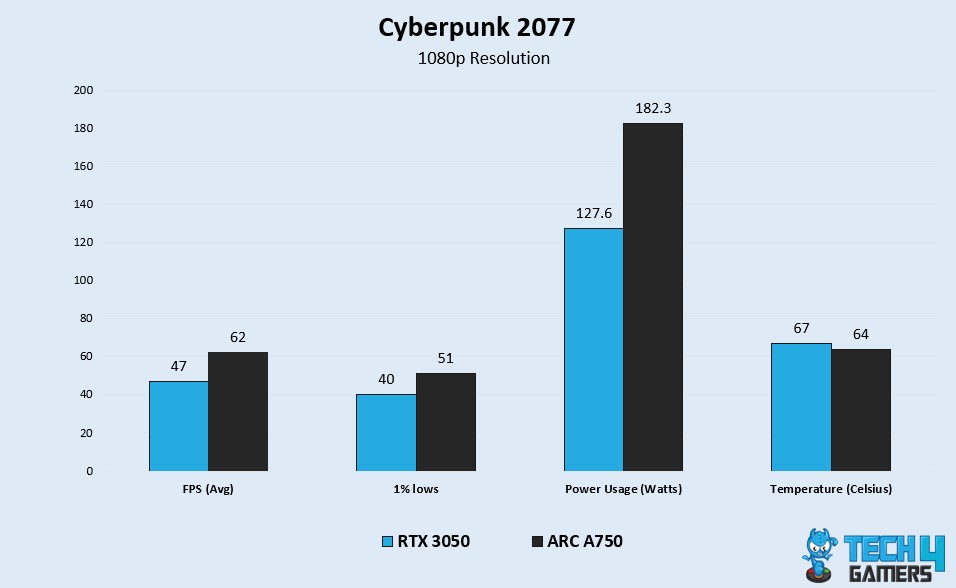
- The ARC A750 achieved 62 FPS in our short benchmark Cyberpunk 2077, but the RTX 3050 ended up touching 47 FPS.
- The ARC A750 operated with 51 FPS at 1% lows, whereas the ARC A750 excelled with 40 FPS.
God Of War
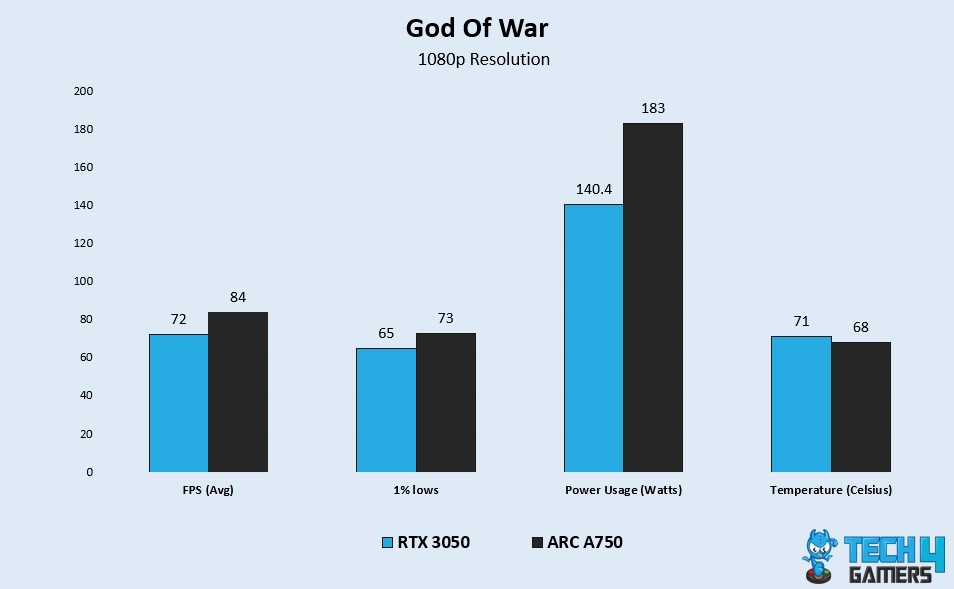
- Our test of The God Of War honored the victory of the ARC A750 as it maintained an average of 84 FPS, contrary to the RTX 3050’s significantly lower 72 FPS average.
- Comparing 1% lows, the ARC A750 has the upper hand with 73 FPS instead of 65 FPS managed by the RTX 3050.
Horizon Zero Dawn
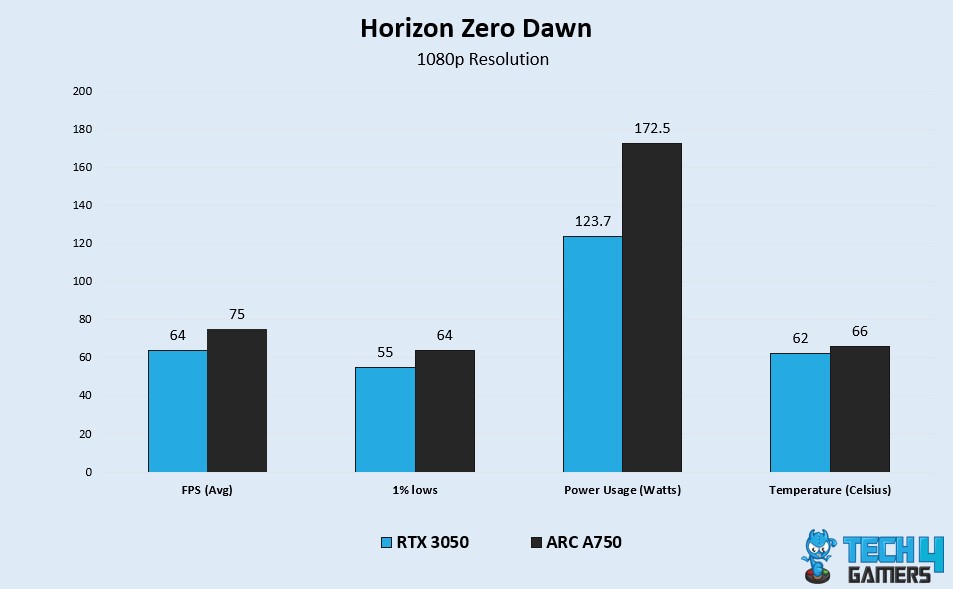
- The ARC A750 provided 75 FPS while we ran Horizon Zero Dawn, which was better than the RTX 3050, which came up with 64 FPS.
- The ARC A750 got 64 FPS at 1% lows; however, the RTX 3050 could merely obtain 55 FPS.
The Witcher 3
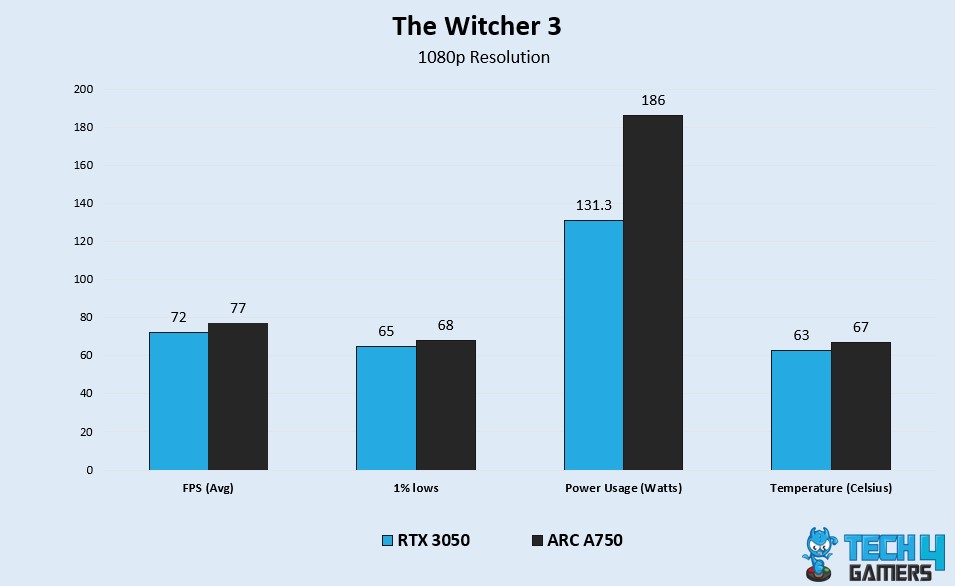
- The Witcher 3 was the last game we tested, and it acted as the closest competition yet, with the ARC A750 finishing off victorious with 77 FPS as the RTX 3050 compelled an average of 72 FPS.
- At 1% lows, the ARC A750 achieved 68 FPS while its competitor, the RTX 3050, did climb to 65 FPS.
Average Framerate
The most crucial consideration when selecting a graphics card is average frame rates. For the games you enjoy playing, frame rate and visual quality must be balanced.
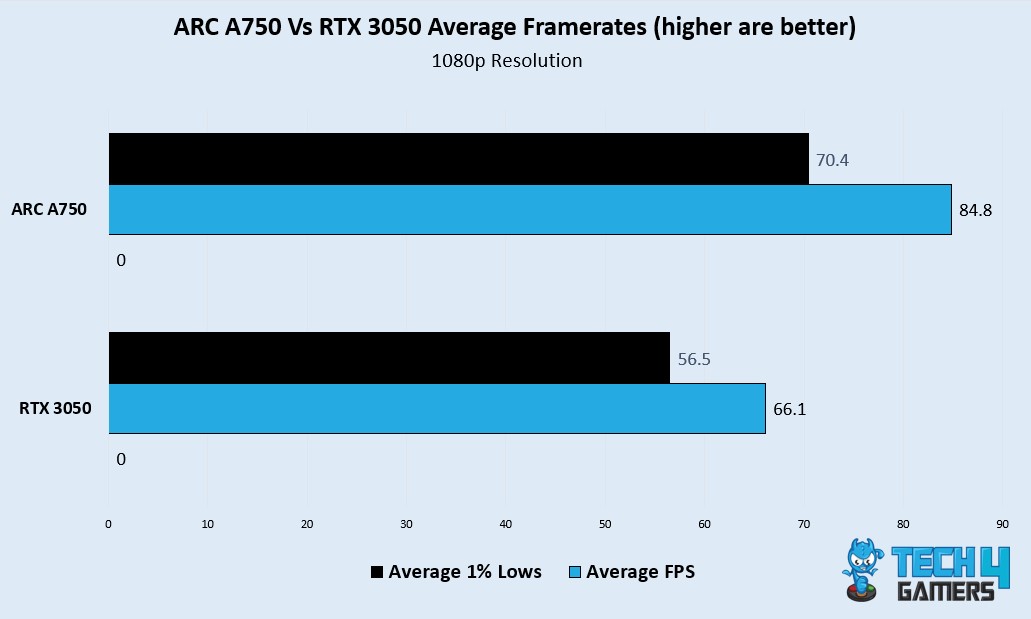
From the games we examined above, the ARC A750 operated with an average of 84.8 FPS. Meanwhile, the RTX 3050 had been running with 66.1 FPS on average. Overall, it was observed that the ARC A750 had 28% more frames, which is a very significant win for the Intel card.
The 1% lows stood around 56.5 FPS for the Nvidia card, while the A750 blew it out of the water with a performance of 70.4 FPS, resulting in much smoother gameplay.
Thermal Efficiency
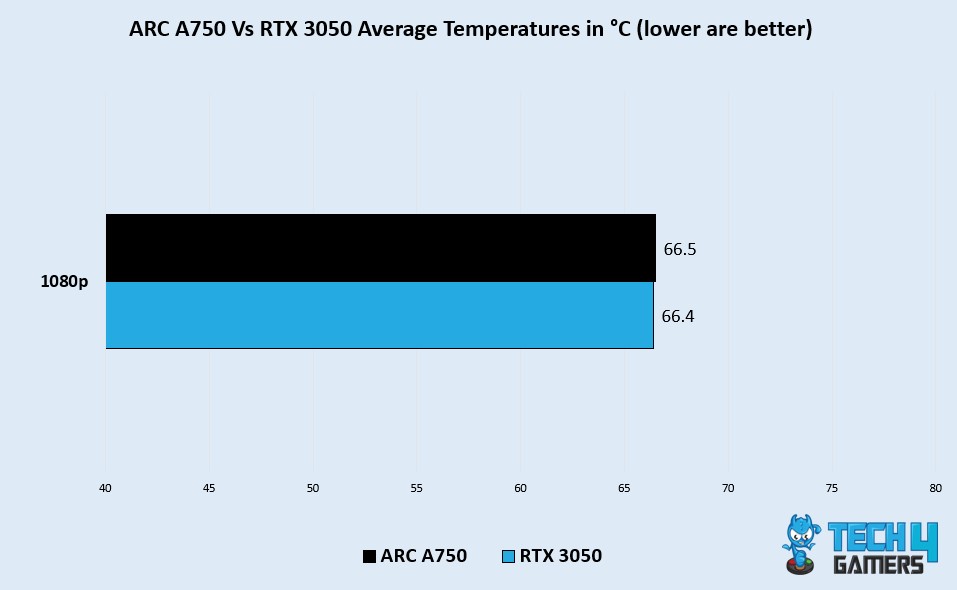
The ARC A750, as in the games played, showed an average temperature of 66.5°C. Its counterpart, the RTX 3050, showed similar temperatures, producing 66.4°C of heat on average. So, the difference remains at only 0.1%, with the RTX 3050 being just slightly cooler. Realistically, this is not significant enough to affect your purchasing decision.
Keep in mind that temperatures are affected by a lot of foreign factors that might be different for you, so take these numbers with a grain of salt.
Power Consumption
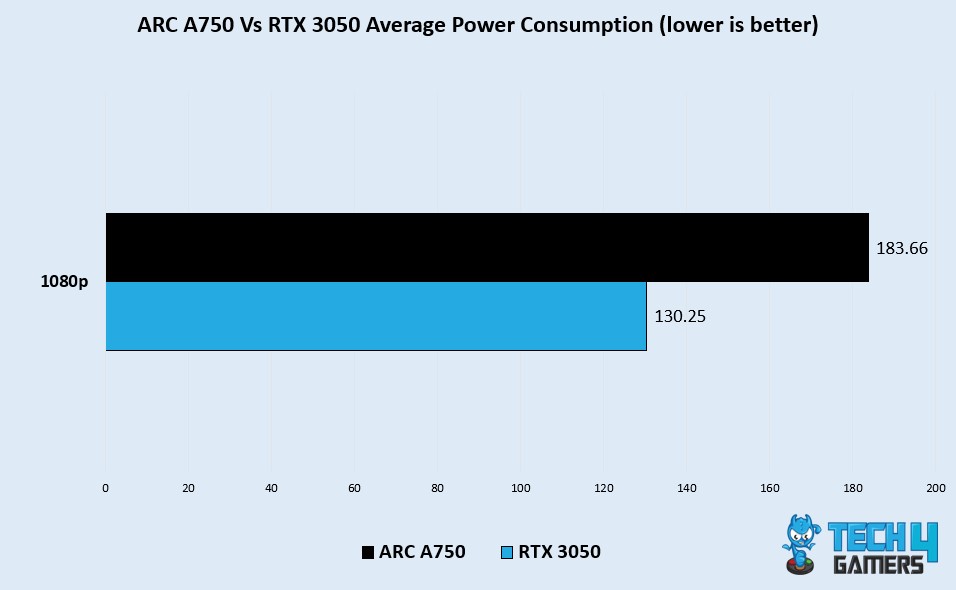
Throughout the games we tested, the ARC A750 consumed an average power of 183.66 W. On the other hand, the RTX 3050 utilized only 130.25W of power on average.
Hence, the RTX 3050 claims victory by being 42% more power-efficient than the ARC A750, making the Intel card look like a power hog.
Pricing And Availability
The price of the ARC A750 ranges from $249 to $310 according to quality and customization, but they are only available in a relatively small number.
In contrast, the price of RTX 3050 fluctuates from $219 to $491, and it is abundantly available on various websites.
What We Recommend
Though the RTX 3050 is more power efficient than the ARC A750, the Intel card has a substantial advantage when it comes to performance, according to our tests.
The price of the ARC A750 also makes it better in terms of affordability. This paints the card as a great entry-level card for anyone on a budget.
The win for the A750 is not as clear-cut, though. The Nvidia card wins in terms of power efficiency, ray tracing, and general stability.
Pros And Cons
| GPU | Pros | Cons |
|---|---|---|
| Intel ARC A750 | Value/cost per frame. Excellent media capabilities. | Not particularly power efficient. Only 8GB of VRAM. |
| Nvidia GeForce RTX 3050 | Power-efficient Full PCIe 4.0x16 connection | Little chance it will sell for MSRP Slower than RTX 2060 and RX 5600 XT |
FAQs
The RTX 3050 is not a high-end graphics card. It is excellent for 1080p gaming and is fairly decent at 1440p. However, it may not be suitable for 4K gaming.
The Intel ARC A750 shares quite a few similarities with the Nvidia RTX 3060 in many ways.
The Intel ARC A750 can be compared to the RX 6600, which do share a few similarities.
No, both cards lack this feature.
More From RTX 3050
More From ARC A750
Thank you! Please share your positive feedback. 🔋
How could we improve this post? Please Help us. 😔
[Comparisons Expert]
Shehryar Khan, a seasoned PC hardware expert, brings over three years of extensive experience and a deep passion for the world of technology. With a love for building PCs and a genuine enthusiasm for exploring the latest advancements in components, his expertise shines through his work and dedication towards this field. Currently, Shehryar is rocking a custom loop setup for his built.
Get In Touch: shehryar@tech4gamers.com


 Threads
Threads